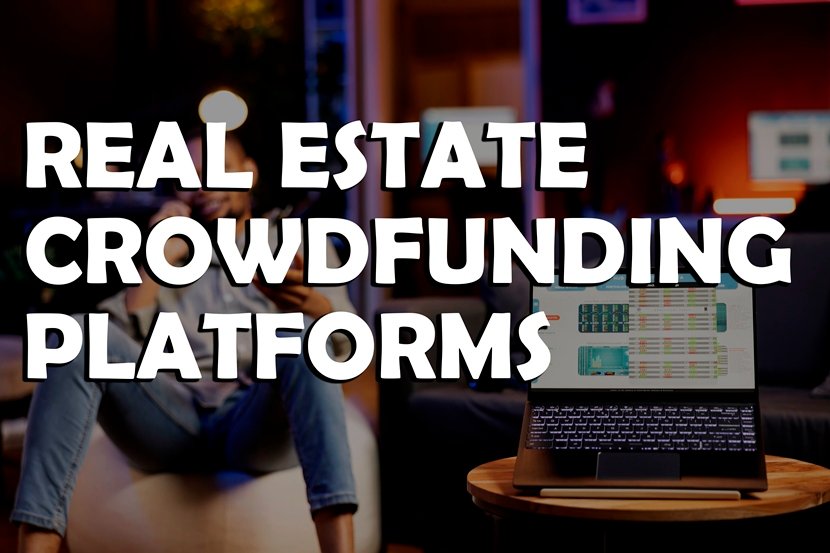Explore the best real estate crowdfunding platforms in 2025. Start investing with low capital, diversify your portfolio, and grow wealth smarter and faster.
Introduction to Real Estate Crowdfunding Platforms
Real estate crowdfunding is the most exciting real property investment technology in 2025. What was once in the hands of deep pockets and institutions is now in the hands of ordinary folks who have a few hundred dollars. Banking on technology to level the playing field, these sites allow numerous investors to get together and finance costly real estate projects, without ever touching a property.
The growth of crowdfunding has been driven by several key factors: digitalization of investment platforms, global connectivity, and changing investor preferences toward diversified and passive income-generating assets. Whether you’re aiming to earn rental income, gain from capital appreciation, or diversify your portfolio, real estate crowdfunding provides a new entry point into an age-old asset class.
Here we will be taking your hand and showing you what real estate crowdfunding is, how it functions, what forms it takes, and the top-performing sites in 2025. You will be knowledgeable about the benefits, the potential pitfalls, and best practices so that you can make rational investment decisions. You will be able to view real estate crowdfunding as a tactic, and not as a phenomenon, by the end of it.
What is Real Estate Crowdfunding?
Real estate crowdfunding involves a method of raising capital for property development by collecting funds from numerous individuals online. Instead of buying an entire property in full, investors are buying a share in a specific deal or series of projects. Capital that is pooled is used to invest in the buying of properties, development projects, or rehab operations.
There are two broad types of real estate crowdfunding, and they are debt-based and equity-based. Equity crowdfunding enables one to buy an interest in a property, and they may benefit from rental yield and return due to appreciation. Debt crowdfunding is lending to a property developer and getting payments of interest periodically, typically with lower but definite returns.
As opposed to traditional property investment, crowdfunding has more entry points, diversification across numerous markets, and passivity. Investors are not burdened with the task of dealing with tenants, fix-it bills, or paperwork—ideal for those seeking access to property without the headache of management.
 How Real Estate Crowdfunding Works
How Real Estate Crowdfunding Works
It is quite simple to join real estate crowdfunding, but one needs to be properly aware of the process to make the right decisions. The investor initially registers on a platform, undergoes an identity verification, and creates his or her account. Once approved, he or she can browse over a list of projects available, which includes location, type of property, financial estimates, and investment terms.
Minimums imposed on the platform range from $10 to thousands of dollars. After an investor has deposited his cash, it is then combined with other investors’ cash to support the chosen project. Proceeds in the model could be either rental income payments, interest rates, or final profits from the sale of an item of property.
The platform is a middleman—existing between projects, mediating contracts, and bringing back proceeds. As much as the safety of passive returns would be a boon for investors, they also rely on the knowledge and management of the platform, the selection of which becomes the genesis of the investment process.
Types of Real Estate Crowdfunding Models
There have been real estate crowdfunding models available based on investment strategy, risk tolerance, and expected returns. All are inviting the investor to invest alongside others in real estate, but vary regarding ownership, rate of return, and risk. They vary from targeting long-term property appreciation to paying out periodic income as interest payments. It pays to see how equity, debt, hybrid, and REIT-based crowdfunding differ from each other prior to putting your hard-earned cash into them because each of them is unique in terms of strengths, taxation treatment, and liquidity profiles. Let us see one by one.
a) Equity Crowdfunding
Equity crowdfunding gives you a percentage of interest in an asset in the real estate space in the form of equity, typically. That is, you receive both the risk and return. The returns come from two sources—periodic rent payments (made irregularly) and capital appreciation when the asset is sold. You are exposed to the performance of the underlying asset as an owner.
One of the largest draws of equity crowdfunding is the prospect of a higher long-term return compared to debt-type products. The returns are not guaranteed and will depend on the rise and fall of the market, the efficiency of real property management, and the ultimate sale price. Your investors should be aware that equity investment will typically be longer-hold positions—five or so years—so your money is tied up for a long time.
This is the most appropriate model for investors who need capital appreciation, are risk-takers in the market, and are not averse to long-term investment. This differs from risky debt crowdfunding, which can have returns that are profitable in the event of the success of the project.
b) Debt Crowdfunding
Debt crowdfunding is about lending money to homeowners or builders to get regular interest payments. You are not buying a percentage of the property, but you are lending. Your returns are set and usually paid out monthly or quarterly until you get your loan back. This reduces risk and usually results in debt crowdfunding being lower risk than equity crowdfunding.
Since the property is collateral, there is that added cushion-if the borrower defaults, the property can be sold to recover some or all of the investment. Proceeds are generally lower than equity investors would receive, and there is still risk of loss if the value of the property drops to zero or the borrower files for bankruptcy.
Debt crowdfunding appeals to investors in search of stable returns as opposed to growth. It is particularly convenient for portfolio diversification by way of secure returns and short investment tenures—6 to 36 months.
c) Hybrid Models
Hybrid crowdfunding combines elements of debt and equity financing. Hybrid investors receive periodic interest return payments (like debt crowdfunding) and also benefit from long-term appreciation of capital value (like equity crowdfunding). The two-way potential of return is appealing to investors who desire a steady cash return as well as capital appreciation.
One of the most widespread hybrid strategies is where some of the investors’ funds are received in the form of a collateralized loan, and some of it is invested in purchasing project equity. It marries the fixed income security with ownership upside potential. Again, their complexity ensures investors carefully read through papers so they exactly understand how returns are being computed and distributed.
Hybrid funds can provide a comfortable middle ground for non-diaphanous investors who are not prepared to place their capital entirely at the mercy of the riskiness of equity but want more promise than debt alone can provide. They are appropriate for long-term strategic investors who want to benefit from diversified sources of income from a single investment.
d) REIT-based Crowdfunding
REIT-based crowdfunding uses an internet platform to offer partial ownership of a Real Estate Investment Trust (REIT). The trusts raise funds to purchase and hold several income-generating properties such as apartments, offices, or warehouses. Income accrues to the investors in the form of dividends from rental income and, sometimes, property value appreciation.
One of the largest advantages of REIT-based crowdfunding is diversification. With an investment in a REIT, your capital is spread out across many properties and geographies, lowering your risk relative to single-asset investments. REITs are more liquid than equity crowdfunding, with some having quarterly redemption.
This type of structure will be best suited to investors who would prefer to be less engaged but get exposure to property. It also has a lower minimum investment and thus is a suitable entry point for new investors. Nevertheless, the gains are potentially smaller when they occur in individual equity deals because the gain is being distributed over the portfolio in a trust.
The Best Real Estate Crowdfunding Platforms in 2025
The Real Estate Crowdfunding sites are as follows:
Fundrise
One of the best-known names in real estate crowdfunding, Fundrise offers diversified portfolios of property to investors for a minimum of $10. Fundrise is primarily dedicated to eREITs and eFunds that invest in income-generating property and development projects. Investors receive quarterly dividend distributions and potential growth.
Fundrise is most appropriate for passive investors and beginners. Fundrise boasts of transparency through performance reporting, project reports, and learning tools. Past performance averaged 7–10% annually, but it is not a guarantee.
RealtyMogul
RealtyMogul invites accredited as well as non-accredited investors to invest in single properties, REITs, and private placements. The minimum investment of $5,000 makes it an attractive choice for the reasonably funded investor. The website reportedly has a high qualification process where relatively few of the applications it processes are accepted.
Investors have the option to choose income-focused and growth-focused portfolios according to their personal investment and financial needs. RealtyMogul also provides thorough information regarding the properties along with risk analysis so that investors can make informed choices.
CrowdStreet
CrowdStreet caters to accredited investors who seek direct investment in large commercial real estate projects. Minimum investment starts typically at $25,000, so it is advisable for those who have lots of money. CrowdStreet’s website is also renowned for its large deal rooms, including access to project materials, market reports, and sponsor background.
This website allows the investor to select individual deals one by one rather than investing in a managed fund. Higher potential returns but also risks since success depends on the project.
DiversyFund
DiversyFund is a growth-focused platform that trades multifamily real estate developments. It only costs as low as $500, which makes it more affordable for more investors. It stands out from almost all of its competitors in the sense that it handles all of the property acquiring, rehabbing, and managing in-house with fewer third-party operators.
Investors earn their returns largely through appreciation in property, and profit is made on the realization of properties following a standard five-year holding period. The long-term strategy is attractive to investors who are looking for capital appreciation as opposed to a short-term return on investment.
Groundfloor
Groundfloor is a short-term property debt investment that pays substantial returns. It is one of the friendliest sites for new investors, with a minimum investment of just $10. The projects typically fund home property repair, so-called “fix-and-flip” deals, with repayment terms ranging from six to 18 months.
The platform allows complete transparency to the investors, e.g., borrower credit scores, loan grades, and project updates. The returns—usually 7–14%—are very high, though, with the risk of borrower default.
EstateGuru
One of the highest-rated global property crowdfunding sites, EstateGuru, offers exposure to mortgage-backed property in Europe. It is accessible to investors with a minimum investment of just €50, making it suitable for geographic diversification. From residential and commercial development projects through to industrial projects, they are typically supported by first-rank mortgage security.
Investors can select projects based on interest rates, loan terms, and risk. EstateGuru’s cross-border solution allows diversification across many economic setups, hopefully avoiding stuck overall portfolio returns.
How to Select the Appropriate Crowdfunding Platform
Selecting the right platform is likely the most important real estate crowdfunding choice. Start by specifying your investment goal: Do you need steady income, long-term growth, or both? If liquidity matters, focus on those platforms that handle more short-term debt offerings or REIT-based investments.
Fees can be a big return-buster, so study each site’s fee policy carefully. Transparency is also important—check for sites that give detailed project reports, performance metrics, and frequent investor updates.
Lastly, investigate the background and status of each platform. Look at investor reviews, examine past project outcomes, and examine the management behind the platform. A good track record on a platform may be a sign of dependability, but remember that past outcomes will not always equate to future success.
Advantages of Real Estate Crowdfunding
✅ Low Barrier to Entry – Minimums of $10, and thus anyone can invest in property without having a lot of capital.
✅ Diversification – Invest in multiple properties and geographies and restrict exposure to one market’s risk.
✅ Potential for Passive Income – Receive returns with no worry about property maintenance or tenant issues.
✅ Special Offers Access – Have access to large commercial projects that would otherwise fall to institutional investors.
✅ Geographic Diversity – Invest in real estate in any corner of the globe without even having to leave your home country.
Disadvantages and Real Estate Crowdfunding Risks
❌ Illiquidity – Most projects lock up money for a few years, limiting your access to your money.
❌ Platform Risk – Your investment is at risk if the platform collapses.
❌ Market Volatility – Market downturn will lower the value of the properties and rental income.
❌ Limited Control – The investors do not have control over the running procedures.
Best Practices for Successful Crowdfunding Investments
Always begin with a small amount to confirm the reliability of the platform before investing a large amount. Explore the offer documents to understand the conditions, risks, and expected loss. Diversify and spread the risk through property type, location, and even platforms.
Track updates provided by the platform and maintain against financial performance targets. Foremost, never invest money you cannot keep in reserve for the short term—real estate crowdfunding is a medium- to long-term investment means.
Real Estate Crowdfunding Frequently Asked Questions
Q1: Is real estate crowdfunding allowed in my nation?
Laws vary from state to state, so check your state securities laws before you invest. Many sites are under close financial regulation for the protection of investors.
Q2: Do I have to be an accredited investor?
No. Some sites limit their participation to accredited investors, but others provide non-accredited participant services with lower minimums.
Q3: How will profits be distributed?
Returns may be in the form of rental returns, interest returns, or a lump sum on the disposal of the property, depending on the nature of the investment.
Q4: Are returns certain?
There is no risk-free investment. Sites try to provide an estimate of the return, but market movements and project success can create variations.
Q5: What taxes are paid on crowdfunding returns?
Taxes depend on investment type and state. Interest and rental income generally are taxed as ordinary income, but appreciation may be eligible for capital gains taxation.
Q6: May I withdraw my investment earlier than planned?
Equity investments normally are not liquid until completion of a project, but secondary transfers or early exits can be managed through special debt provisions.
Conclusion: The Future of Real Estate Crowdfunding
Real estate crowdfunding has transformed property investing in a manner that individuals can get access to high-value property markets without the drawback of being the outright owners. With improved platforms and a regulatory landscape, new and experienced investors now get to step through open doors.
While the positives are tempting—low barriers to entry, diversification, and passive income—the negatives should not be given short shrift. By selecting the platforms appropriately, understanding the investment vehicles, and diversifying, you can put the odds in your favor.
Over the next two years, real estate crowdfunding will play a central role in democratizing wealth generation options. The most important thing is to be well-educated, patient, and long-term focused.











